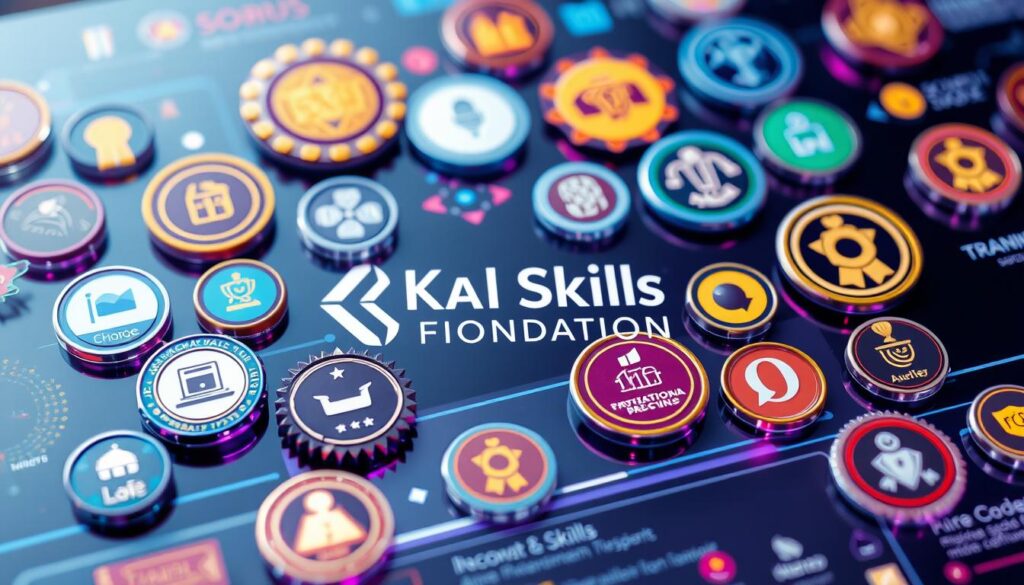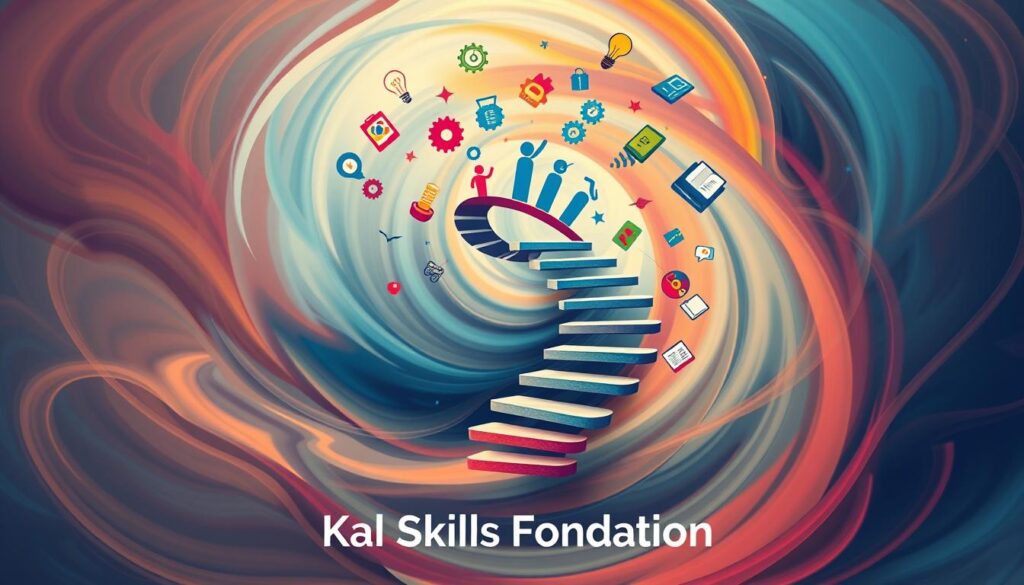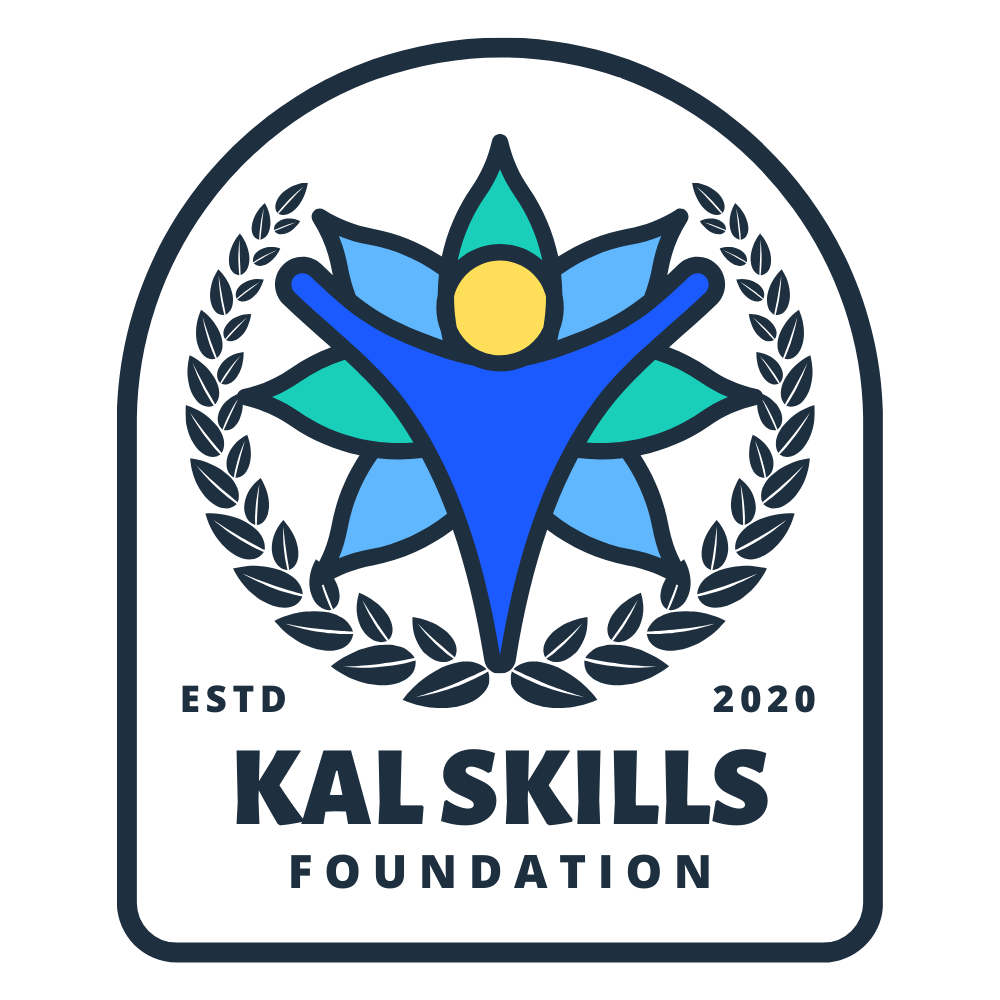In today’s fast-changing job market, it’s more important than ever for professionals to keep improving their skills1. A study in the IT field found that those with specific certifications make about 22% more than those without1. Also, a leading industry group found that 68% of employers see certifications as key when hiring1.
This guide will dive into why employee certifications are so important. We’ll look at the benefits, the process of getting certified, and how the job market is changing. We’ll also talk about how AI is changing the way we learn. By the end, you’ll know how certifications can help your career, improve your skills, and meet industry standards.
Key Takeaways
- Certifications can lead to higher salaries and increased job opportunities.
- Employers often consider certifications as a critical factor in hiring decisions.
- Certifications can help professionals advance their careers and gain a competitive edge.
- The certification process involves comprehensive curriculum and skill assessment.
- Continuous learning and staying up-to-date with industry trends are essential for career growth.
The Importance of Professional Certifications in Today’s Workforce
In today’s fast-changing job world, getting professional certifications is key. They help show off your professional skills, help you grow in your career, and meet industry standards2. These certifications prove you’re an expert, giving you an edge in finding a job.
With so many people and jobs out there, employers need clear signs of who’s best3. Certifications are like a stamp of approval. They show employers you have the skills and knowledge to do well in your job. This makes you more credible and helps your employer trust you to do great work.
Also, in a competitive job market, certifications help you stand out3. Getting certified shows you’re serious about improving your skills. Employers value this because they want a team that’s both skilled and motivated.
Getting certified is good for you and your employer3. Certified workers are more likely to be happy, productive, and good at solving industry problems. This helps your employer stay ahead and succeed in the long run.
“Professional certifications are widely recognized within industries as markers of expertise and competence.”3
| Key HR Certification Programs | Description |
|---|---|
| SHRM Certified Professional (SHRM-CP) | Demonstrates knowledge and application of HR principles in operational roles. |
| SHRM Senior Certified Professional (SHRM-SCP) | Recognizes strategic HR expertise and the ability to lead in complex situations. |
| Professional in Human Resources (PHR) | Validates expertise in the technical and operational aspects of HR management. |
| Senior Professional in Human Resources (SPHR) | Demonstrates mastery of the strategic and policy-making aspects of HR management. |
In today’s fast-changing job world, certifications are a powerful tool. They help you show your skills, advance in your career, and help your organization succeed2. By getting certified, you can stand out, build trust, and be seen as a valuable asset in your field.
Understanding the Benefits of Certification
Earning professional certifications shows your credibility and skill in your field. These certifications prove your hard work and knowledge, making others trust you more4.
For those who work directly with clients, like consultants or project managers, certifications are key. Clients trust those who keep learning and improving, showing they care about quality work4.
Credibility and Competence
Certifications show you’re credible and skilled in your area. They make others believe in your abilities, knowing you’ve passed tough tests4.
Competitive Advantage
In today’s job market, certifications help you stand out. Employers see certified people as more valuable, showing they’re committed to learning5.
Also, certified people often earn more. For example, those with Project Management Professional (PMP) certification make 26% more than non-certified ones5.
Building Trust with Clients and Colleagues
Certifications help build trust with clients and colleagues. They show you’re serious about doing great work and meeting high standards. This is crucial in fields like finance, healthcare, or tech4.
Also, working at a certified company makes employees proud. They’re more likely to recommend their workplace and stay longer4.
The Certification Process: A Rigorous Learning Journey
Getting a professional certification is more than just a yes from someone. It’s a tough journey that pushes you to learn more, improve your skills, and show you can do the job well6.
Certification programs cover the basics and more, mixing theory with hands-on learning. They use different tests, like exams and projects, to make sure you really get it6.
Comprehensive Curriculum and Skill Assessment
The courses in certification programs are made to match what’s needed in the real world. They teach you what you need to know and do to succeed6. The tests check if you can solve problems and use what you’ve learned6.
Industry-Aligned Standards and Best Practices
These programs work with experts and leaders in the field to keep their content fresh. This makes sure what you learn is what’s needed now6. It shows you’re ready to do well in your job6.
The path to getting certified is tough but rewarding. It pushes you to learn more, get better at what you do, and show you can apply what you know in real life. By passing the tests, you prove you’re serious about being the best in your field6.
Certification and Professional Development: A Strategic Investment
Getting certified is more than just learning; it’s a smart move for your career. It opens up more job options and can lead to better pay and more responsibility7. Plus, it shows you’re ready for leadership roles, thanks to your skills and knowledge7.
Opening Doors to New Opportunities
Certifications give you the edge you need in today’s job market7. They help you learn fast and change careers easily7. Having the latest skills keeps your company ahead, leading to success7.
For example, getting certified in Learning and Performance (CPLP) or Talent Development (APTD) from ATD can boost your career7. So can Professional in Human Resources (PHR) and Senior Professional in Human Resources (SPHR) from HRCI7.
Facilitating Career Progression and Advancement
Trained employees are happier and more productive, which is good for business7. Companies that invest in training see better results and happier workers7.
The Learning and Performance Institute (LPI) checks if you’re good at making learning work for your company7. The Certified Performance Technologist (CPT) from ISPI helps improve how well your team works together7.
Teams with certified members finish projects 25% faster, says a study by IDC and ITCC8. By 2026, over 90% of companies will struggle with IT skills, losing billions, according to IDC8. Getting certified can help you learn about AI, cloud, programming, and cybersecurity, where jobs are in high demand8.
“Companies that invest in Learning and Development (L&D) initiatives experience increased efficiency and improved bottom-line results due to more engaged and productive employees.”7
Skills get outdated fast, so keeping up is key8. By investing in certification and growth, you’re ready for new challenges and stay ahead in the job market.
Adapting to the Evolving Certification Landscape
Technology is changing how we work, and so is the world of professional certification. Digital badges and micro-credentials are becoming more common. They offer a detailed and flexible way to show your skills9.
Online learning platforms have made getting certified easier than ever. They let you learn at your own pace, fitting your schedule9. This is great for those with busy lives or jobs, making learning more open to everyone.
Digital Badges and Micro-Credentials
Now, employers care more about what you can do than what you’ve learned10. They use micro-credentials to prove you have specific skills10. Digital badges follow a standard, making it easy to show off your skills without worrying about time or money10.
Online Learning Platforms and Accessibility
Many places offer learning chances, like training and coaching10. They track your progress, so you can see how you’re doing10. This makes learning more accessible, helping you reach your goals no matter where you are or what you’re doing.

Companies can use, create, or partner on micro-credentials10. Digital Promise is a leader in this area, with over 10 years of experience10. They help show your skills, making it easier to share your achievements with others10.
“Micro-credentials provide a flexible way to recognize discrete skills, addressing constraints on time, money, and resources.”
Challenges and Criticisms: Navigating the Complexities
Certifications have many benefits, but they face challenges and criticisms. One big issue is that they can become outdated fast, especially in quick-changing industries11. To keep up, certification bodies need to be quick to update their programs with new industry trends11.
Some people think certifications are too general, like they don’t offer the same value as a college degree11. Yet, certifications are great for learning specific skills that can be very useful. They often work well alongside a college degree11.
Keeping Certifications Up-to-Date
As industries and tech change fast, keeping certifications current is key. Certification bodies must keep their programs fresh by adding new content and standards11. This way, professionals can stay current and avoid having outdated certifications11.
Certifications vs. Formal Education
The debate on certifications versus formal education is ongoing. Both have their strengths, depending on the career and personal needs11. Certifications are good for learning specific skills in a practical way, while formal education provides a wide base of knowledge11. Combining both can be a smart move for career growth11.
As the job market and workforce evolve, dealing with certifications and education will keep getting harder for everyone12. It’s important to keep learning, adapt, and communicate well to make certifications valuable in today’s job world12.
“The certification process is not a one-time event, but a continuous journey of adapting to the changing industry demands and technological advancements.”
The Role of AI in Certified Learning
Artificial intelligence (AI) is changing how we learn and get certified. It can look at how we learn and what we know to make learning paths just for us. This makes getting certified faster and more focused13.
Adaptive Learning Paths
AI can change learning paths based on how well we do and what we’re good at. This means we get lessons that fit our goals and how we learn best. It makes learning more fun and helps us do better14.
Predictive Analytics for Success
AI uses data to guess if we’ll pass a test based on how we’ve done before. This helps both us and our teachers see where we need to get better. It’s a big help in making sure we succeed15.
Real-time Assessment and Feedback
AI gives feedback that changes as we do better or worse. This helps us get better at what we’re doing and shows off our strengths. It makes learning more personal and meaningful14.
As more people need skills, AI will be key in helping us learn and show what we know. It makes learning faster and more effective131514.

Employee Certifications: Enhancing Professional Skills
Getting professional certifications is a smart move for career growth. It shows you’re serious about learning and staying up-to-date in your field16. These certifications prove you’re ready for new challenges and opportunities.
Certifications offer a clear path for learning and improving. For example, the Certified Professional in Learning and Performance (CPLP) needs at least five years of work experience or nine years of education and experience16. The Certified Business Relationship Manager (CBRM) requires at least one year of experience in business relationship management16.
It’s important to keep learning after getting certified. The Association of Change Management Professionals (ACMP) offers the Certified Change Management Professional (CCMP) for those with a bachelor’s degree and 3 to 5 years of experience16. These certifications show you’re always ready to learn and adapt.
Certifications are also great for employers. They help spot and grow the skills of their team. The Project Management Professional (PMP) certification, for instance, boosts the credibility of project managers16. The Certified Business Development Professional and Certified Business Operations Professional (CBOP) show off specialized skills16.
By getting certified, you stand out in the job market. It shows you’re committed to learning and growing17. This not only helps you but also your company17.
Continuous Learning: A Key to Career Growth
In today’s fast-changing work world, learning never stops is key for career growth. By always learning, you stay ahead and become more valuable to your company18.
Professional Development Courses
Professional development courses help you grow your skills and knowledge. They cover everything from new software to leadership skills19. These courses open doors to new jobs and bigger challenges.
Online Resources and Industry News
Today, you can find lots of learning online. Websites, webinars, and blogs keep you up-to-date with the latest trends19. Staying informed keeps your passion for learning alive and helps you think outside the box.
Learning continuously is good for you and your employer19. It shows you’re adaptable and committed to doing your best. This can lead to more job satisfaction and better career chances.
“Continuous learning is the key to unlocking new doors and propelling your career forward. It’s not just about accumulating knowledge, but about developing the agility and resilience to thrive in an ever-changing business landscape.”

But, learning continuously has its hurdles. Time, money, and fear of failure can slow you down19. Yet, by using free resources, making time to learn, and getting advice, you can beat these challenges and grow your career.
Networking and Collaboration: Maximizing Learning Opportunities
Looking to grow professionally? Networking and collaboration can help a lot. Attending professional events like seminars and workshops lets you meet experts. You can share ideas, learn new things, and keep up with trends in your field20.
Online networking and social media are also great for making connections. They help you stay current with industry news and promote your skills. You can talk with peers, follow leaders, and join discussions that spark new ideas21.
- Use sites like LinkedIn to connect with colleagues and join groups.
- Join online forums, webinars, and events to learn and share your knowledge.
- Use social media to show your work, share content, and connect with others.
By using both in-person and online networking, you can learn more. You’ll stay updated on your field and become a well-known professional21.
“Networking is not about just connecting people. It’s about connecting people with people, people with ideas, and people with opportunities.”
– Michele Jennae
Staying Ahead of the Curve: Embracing New Technologies
The tech world is always changing. To stay ahead, you need to learn new things and keep up with trends. People who go to workshops and webinars learn 20% more about new skills22. Working with others from different fields can also help, leading to 25% more innovation22.
Big tech companies like Amazon and Google are leading the way in learning. Amazon’s “Amazon Technical Academy” teaches skills like coding and data science23. Google has “Grow with Google” for online learning23. They use cool tech like VR and AR to make learning fun and real23.
The digital market is expected to hit $1 trillion by 202524. New tech like AI and IoT helps businesses understand customers better. This changes how we interact with customers and makes them happier24. Using social media and SEO can also help you reach more people24.
Keeping your skills up to date makes you more valuable. It opens doors to new chances for growth. Embracing new tech is crucial for staying ahead in the fast-paced tech world.

| Technology | Impact |
|---|---|
| Agile project management | 30% improvement in team flexibility, product quality, and speed to market22 |
| Remote and hybrid work models | 15% increase in productivity and innovation levels within teams22 |
| Customer-centric innovation | 35% increase in customer satisfaction rates and loyalty, 20% growth in market share22 |
| Continuous security training | 40% reduction in cybersecurity breaches and data vulnerabilities22 |
| Ethical technology development | 30% increase in public trust and positive brand perception22 |
By embracing new tech and trends, you can improve your skills and drive innovation. Remember, always learning and adapting is key to success in the tech world.
Self-Assessment and Skill Development Strategies
First, do a thorough self-assessment to find out your hard and soft skills. This is the first step in your professional growth. It helps you know your strengths and what you need to work on. This way, you can make a plan to improve and reach your goals25.
Hard and Soft Skills
Hard skills are the technical skills you learn through school, training, or work. Examples are programming, data analysis, or managing projects. Soft skills are about how you interact with others, like communication, problem-solving, and thinking critically2526.
Assessing your skills shows where you’re good and where you need to get better. This lets you take control of your career growth. It makes you more engaged and happy at work26.
Creating a Professional Development Plan
After knowing your skills, make a professional development plan. This plan should have clear goals, steps to take, and a timeline for learning and improving26.
Your plan might include taking more classes, online courses, or using new skills on the job. Being proactive in learning new skills boosts your problem-solving and creativity. It also helps your company innovate2526.
Keep in mind, self-assessment and skill development never stop. Update your plan often to stay ahead and succeed in your career26.
Conclusion
Employee certifications are a great way to boost your skills and career. They show you’re an expert and can open new doors. It’s important to keep up with new tech, like AI learning platforms, to stay relevant2728.
By always learning and improving, you set yourself up for success. This helps your industry grow and become more professional2728. Getting certifications is a smart move for your future. It gives you the skills and confidence to succeed in today’s fast-changing job world.
Don’t miss out on the chance to grow your professional skills, advance your career development, and meet industry standards. Your dedication to learning and growing will help you and your company succeed.
FAQ
Why are professional certifications important in today’s workforce?
What are the key benefits of pursuing professional certifications?
How does the certification process work?
How can professional certifications impact career development?
How is the landscape of professional certification evolving?
What are some of the challenges and criticisms surrounding professional certifications?
How is AI impacting the professional certification process?
What are some strategies for continuous learning and skill development?
How can networking and collaboration contribute to professional growth?
Why is it important to stay ahead of technological advancements in your industry?
How can a self-assessment help in your professional development?
Source Links
- The Significance of Certification in Professional Skills Development – https://www.linkedin.com/pulse/significance-certification-professional-skills-gary-homes-taaie
- The Importance of HR Certification in Today’s Workplace – https://auroratrainingadvantage.com/articles/importance-of-hr-certification/
- Enhancing Workforce Competence: The Importance of Professional Certification Training for Employees – https://www.linkedin.com/pulse/enhancing-workforce-competence-importance-professional-certification-xlt6f
- 11 Benefits of Earning Great Place To Work Certification™ – https://www.greatplacetowork.com/resources/blog/11-benefits-of-getting-great-place-to-work-certified
- 5 Ways Professional Certifications Add Value – https://www.mbopartners.com/blog/how-manage-small-business/five-benefits-of-professional-certification/
- Step-by-Step Guide On How To Get A Certification In Your Field | Sertifier – https://sertifier.com/blog/step-by-step-guide-on-how-to-get-a-certification-in-your-field/
- Essential learning and development certifications for your business – https://devskiller.com/blog/learning-and-development-certifications/
- The Power of Having Certified IT Professionals in Your Organization – https://www.shrm.org/topics-tools/news/organizational-employee-development/the-power-of-having-certified-it-professionals-in-your-organizat
- The Future of Work: How PMI CPs Can Stay Relevant in the Evolving Industry Landscape – https://redlearning.org/the-future-of-work-how-pmi-cps-can-stay-relevant-in-the-evolving-industry-landscape/
- Unlock Success: Transform Organizational Training with Micro-credentials – Digital Promise – https://digitalpromise.org/2024/03/28/unlock-success-transform-organizational-training-with-micro-credentials/
- Top 10 Challenges of Employee Retention | Inspirus – https://www.inspirus.com/blog/the-challenges-of-employee-retention-navigating-through-a-dynamic-workforce-landscape/
- Navigating complex workplace challenges: strategies for people leaders – https://www.lepaya.com/blog/navigating-complex-workplace-challenges-strategies-for-people-leaders
- Is an Artificial Intelligence Certification Valuable For My Career? – https://www.utsa.edu/pace/news/artificial-intelligence-certification-valuable-for-my-career.html
- How is AI Used to Support Professional Training and Development? – https://trainingmag.com/how-is-ai-used-to-support-professional-training-and-development/
- Making the case for AI training in your organization | TLNT – https://www.tlnt.com/articles/making-the-case-for-ai-training-in-your-organization
- Top Certifications for Corporate Trainers in 2024 (Ranked) – https://www.tealhq.com/certifications/corporate-trainer
- Advanced Employee Training & Skills Management System – https://skilldirector.com/employee-skills-management
- 8 reasons why continuous learning is crucial for career growth – https://www.cornerstoneondemand.com/resources/article/8-reasons-why-continuous-learning-is-crucial-for-career-growth/
- Introduction: The Importance of Continuous Learning in Career Development – https://www.kgcareeracademy.com/post/introduction-the-importance-of-continuous-learning-in-career-development
- The Power of Continuous Learning: Strategies for Professional Development in the Workplace – https://trainingmag.com/the-power-of-continuous-learning-strategies-for-professional-development-in-the-workplace/
- Maximizing Employee Growth with Continuous Learning – https://www.hrvisionevent.com/content-hub/maximizing-employee-growth-with-continuous-learning/
- Innovation in Tech: How to Stay Ahead of the Curve in a Rapidly Changing Landscape – Amazic – https://amazic.com/innovation-in-tech-how-to-stay-ahead-of-the-curve-in-a-rapidly-changing-landscape/
- How can companies leverage technology to enhance training programs and foster innovation in the workplace? – https://psico-smart.com/en/blogs/blog-how-can-companies-leverage-technology-to-enhance-training-programs-and-foster-innovation-in-the-workplace-13564
- Staying Ahead of the Curve: Keep Evolving in Your Digital Business – https://www.linkedin.com/pulse/staying-ahead-curve-keep-evolving-your-digital-business-michael-weare-vgq7e
- Skills Self-Assessment: Empowering Employee Development – Nestor – https://nestorup.com/blog/skills-self-assessment/
- The importance of self-assessments for employees and managers – Ethena – https://www.goethena.com/post/the-importance-of-self-assessments-for-employees-and-managers/
- 6 Types of Employee Assessments & How to Utilize Them – https://www.intoo.com/us/blog/what-are-employee-assessments/
- 12 Types of Employee Training—Advantages & Examples – Pollack Peacebuilding Systems – https://pollackpeacebuilding.com/blog/types-of-employee-training/





